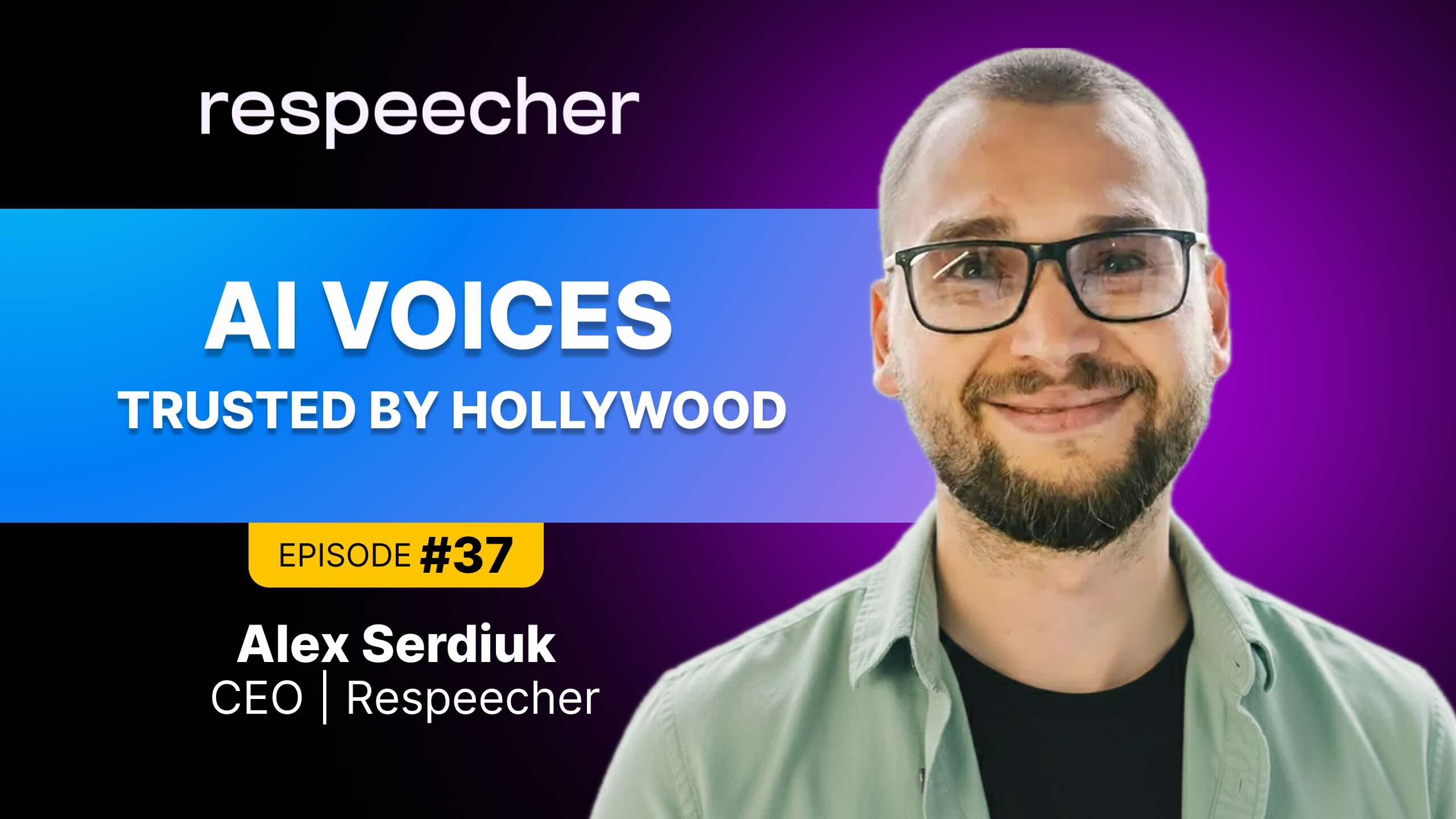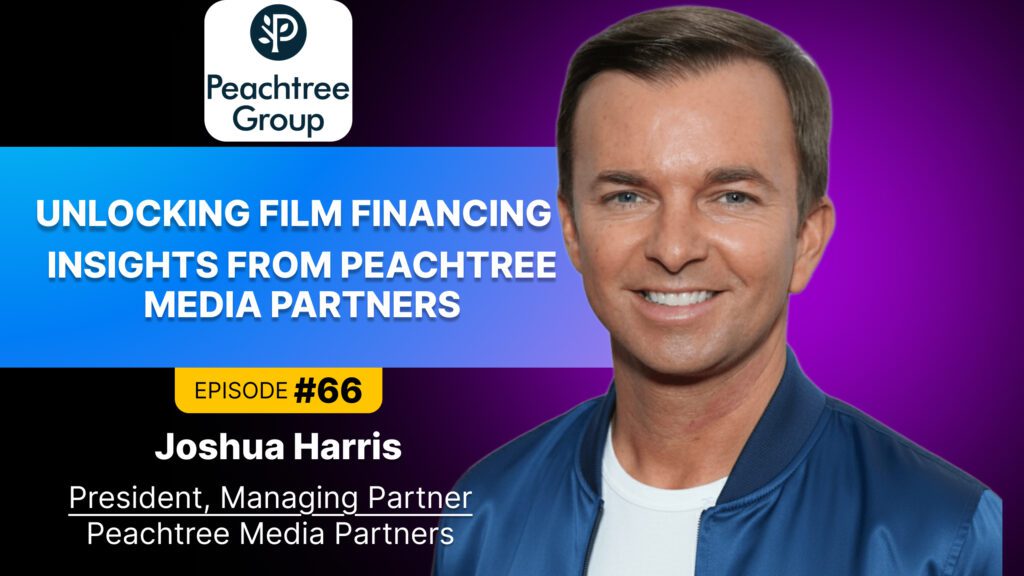Respeecher is at the forefront of synthetic voice technology, empowering creators to surpass the limitations of human voice capabilities. Our solutions offer unparalleled voice quality and control, opening limitless possibilities in film, gaming, animation, and beyond.
Podcast Chapters
| Timestamp | Podcast Segment |
| 5:14 | Understanding Respeecher’s Elevator Pitch |
| 12:30 | Key Stakeholders in Film Projects |
| 20:20 | Use Cases of Synthetic Voice Technology |
| 30:39 | Ethics and Trust in AI Voice Technology |
| 37:32 | Integration with Adjacent Technologies |
| 40:38 | Engagement with Actors and Talent Rights |
| 48:24 | Future Innovations and Roadmap |
Respeecher specializes in creating Hollywood-grade synthetic voices for film, TV, and gaming. The technology seamlessly converts one voice into another, replicating nuances and emotions required for high-quality productions.
Key Takeaways:
✅ Hollywood-Approved AI Voices – Featured in major productions including The Mandalorian, Book of Boba Fett, Better Man, The Brutalist, and Cyberpunk 2077.
✅ Award-Winning Innovation – Contributed to four Oscar-nominated projects, with two wins in 2025.
✅ Ethical & Trusted Technology – Respeecher maintains strict ethical standards, ensuring permissions from voice talent and guarding against misuse.
✅ High-Quality & Scalable Solutions – Delivers voices capable of integration with Dolby Atmos and widely-used industry software like Pro Tools, Unity, and Unreal Engine.
✅ Diverse Use Cases – Applications in ADR simplification, accent modification, voice de-aging, dubbing, localization, gaming, amusement parks, and interactive marketing.
✅ Global Expansion & Accessibility – Enables creators globally to leverage voices across languages and markets, enhancing localization efforts with authentic vocal performances.
Sound Bites:
🎬 “Synthetic voice isn’t replacing creativity; it’s amplifying human potential.”
🚀 “We build trust first—our technology has always been driven by ethical responsibility.”
💡 “Our voice models now deliver Hollywood-level performance at unprecedented scale and speed.”
📈 “Synthetic voices open entirely new creative possibilities—from reviving historical voices to enabling real-time fan engagement.”
🤖 “AI voices will transform production workflows but will always need human direction.”
About Respeecher
Why Partner With Respeecher?
✅ Hollywood Quality Voice Solutions – Trusted by industry leaders including Disney, Warner Bros., Sony, and Skywalker Sound.
✅ Ethics-First Approach – Strictly ethical practices with robust permissions management from voice talent.
✅ Cutting-Edge Technology – Continuously innovating with AI-driven real-time text-to-speech and speech-to-speech solutions.
✅ Flexible Integration – Easily integrates into existing workflows and platforms like Pro Tools, Unity, and Unreal Engine.
✅ High Scalability – Capable of generating billions of voice outputs efficiently and economically.
✅ Innovative Applications – Expands possibilities in creative storytelling, localization, interactive marketing, and audience engagement.
In Conversation with Alex Serdiuk, CEO at Respeecher
Welcome to a succinct written summary of our insightful podcast with Alex Serdiuk, co-founder and CEO at Respeecher. This transcript provides a concise Q&A format for quick reading, covering a range of topics about synthetic voice technology, its applications, and Alex’s experiences.
- Vitrina: Congratulations on your Oscar successes, Alex! Could you elaborate on the Respeecher projects that were recognized?
Alex Serdiuk: Yeah, thank you so much. And the Oscars this year have been amazing for us because we’ve got four projects we are credited and nominated at Oscars and two of those won, which is really cool. So it’s the biggest you can get, right, in terms of the awards in the industry. And it’s so great to be associated with some of the best pieces out there.
- Vitrina: Can you detail the specific contributions your technology made to these acclaimed projects?
Alex Serdiuk: Yeah, so at Oscars we had LA and Romulus we are credited in, we had Better Man we are credited in for Better Man, did narrations of Robbie Williams, some of the songs in Robbie Williams’ voice, we had The Brutalist, which won the best actors and others, we were in charge of Adrian Brody and Felicity Jones’ Hungarian accents. We were working on perfecting their Hungarian accents. And we had Emilia Peres, who won the best song. And we were working on the song exactly. So Emilia Peres wasn’t able to sing because she was going through a voice transformation. And our technology was used to help to make this song.
- Vitrina: How does Respeecher handle the technical process of voice transformation for such high-profile projects?
Alex Serdiuk: The process is pretty straightforward. So we need recordings of what we call a target voice, say, Mark Hamill for Mandalorian and the Book of Boba Fett. Those recordings from 40, 45 years ago, exactly how he should sound like. And then we put those recordings into the technology. We basically train an engine to be able to convert human speech or in some cases, text to be fed into that model.
- Vitrina: Moving forward, could you explain how the use of synthetic voice technology has evolved in the industry, particularly in your projects?
Alex Serdiuk: Yeah, the industry has changed. Now the industry starts to adopt all this pre-production, prods, amusement parks, marketing, trailers, contact centers, use cases for synthetic voice. What we’ve been focused on building at Respeecher is two pillars. That would be quality of the sound and trust. And trust is essential for this industry. Our technology has never had any caveats in ethics. No one ever misused the technology, which we see as a big issue, which we foresee as a big issue in the industry when we just started.
- Vitrina: What about the engagement with studios and directors? How does that interaction typically unfold?
Alex Serdiuk: Usually, those are two counterparts. One is director and another counterpart is sound, meaning sound supervisor, sound editors, sound mixers, all those people who are involved in to do stuff with their hands and with their ears of what we provide. In the very early days, we’ve been engaging with studios from a sound perspective. But now it’s more and more often where we engage with directors first.
- Vitrina: Could you share an example of a project where your technology significantly impacted the production process?
Alex Serdiuk: One good example would be Endurance by National Geographic. It was done by an independent team, but then I believe it was bought by National Geographic. The idea was that there is a huge story, a big historical asset called the Endurance Expedition. That was a ship called Endurance that was sent to the South Pole led by Shackleton and his team, famous South Pole explorers. The ship was stuck in ice. They managed to survive over months on the South Pole. No one died in this expedition. They all got back and the ship sank. And at some point ago, they got those recordings from the ship itself. They found the box cylinders of the voice recordings of Shackleton and his team. And they also got diaries and they started to make a movie and they wanted to embed their voices. We finally got recordings of the movie, just reading the diaries. So here the technology is not just a post-production tool as it often is, it’s also an enabler to the project itself.
- Vitrina: How do you ensure the ethical use of synthetic voice technology, especially considering the potential for misuse?
Alex Serdiuk: Our approach from the very early days as humans that started to build this technology and started to think about that as a business was very conservative in terms of ethics. So in the very beginning, we thought that we would never let the technology we build, the services we build as a part of our offerings to be used to abuse. The goal was to ensure that our tech cannot be abused in any possible way, as well as the whole concept of synthetic voice could be either highlighted from the bright side or at least protected to some extent by the work we are doing, by the contribution we make to the industry.
- Vitrina: What are the future directions and innovations you are currently excited about in synthetic voice technology?
Alex Serdiuk: We, as usual, very much excited about improving the core technologies, the synthetic voice technology to make it faster, to make it require less data, to make it train faster, to make it require less resources to run on. That’s like constant improvement that’s going on in our R&D and over those seven years we are active in the market. But along with that, we are also picking some interesting ideas, adjacent to the core technology. For instance, right now we are working on what we call a directable text to speech.





 Kyiv, Ukraine
Kyiv, Ukraine




